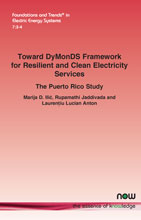Toward DyMonDS Framework for Resilient and Clean Electricity Services: The Puerto Rico Study
By Marija D. Ilić, MIT, USA, ilic@mit.edu | Rupamathi Jaddivada, SmartGridz, Inc., USA, rjaddivada@smartgridz.com | Laurențiu Lucian Anton, MIT, USA, lauanton@mit.edu
Abstract
This monograph focuses on changing electric energy systems and shows how today’s operating and planning practices can be enhanced by relying on data-enabled predictions and decision-making software. In particular, we describe how the Dynamic Monitoring and Decision Systems (DyMonDS) framework can be utilized as a critical unified computer platform for enabling both operations and planning. An extended AC optimal power flow (AC OPF) software designed by SmartGridz, Inc. is used to advise grid operators and planners for managing critical services during hurricanes and other extreme events, and to support the grid enhancement process for decarbonization in Puerto Rico, where many large fossil plants are scheduled for decommissioning. Estimates are given of: (1) about 50% critical load still served during hurricane conditions; (2) 40% total fuel cost decrease; and, (3) reduced requirements for new resource capacity, including microgrids, needed to replace old power plants. Based on the approach described, we suggest that huge opportunities exist to make the most out of what we have by deploying these methods in the Continental United States (CONUS) and elsewhere. Instead of pursuing highcost build-up, we recommended enhancing the utilization of what exists and using data-enabled decision tools to decide systematically, according to well-defined and quantifiable performance objectives, the best upgrades and infrastructure enhancements.
Toward DyMonDS Framework for Resilient and Clean Electricity Services: The Puerto Rico Study
This monograph focuses on changing electric energy systems and shows how today’s operating and planning practices can be enhanced by relying on data-enabled predictions and decision-making software. In particular, this monograph describes how one can utilize the Dynamic Monitoring and Decision Systems (DyMonDS) framework as a unified computer platform for supporting the interactive participation of diverse grid users. It is shown that this framework can be used to systematically compute the most effective enhancements needed for ensuring resilient, cost-effective and clean electricity services in Puerto Rico. The study utilizes a bulk power system model developed by MIT Lincoln Lab from publicly available data. The focus is on the feed-forward predictable loss of equipment and the role of extended AC optimal power flow (AC OPF) in enabling resilient electricity service during extreme events, using the SmartGridz, Inc. AC OPF software.
The monograph first describes the findings obtained by an earlier Puerto Rico study performed by the MIT Lincoln Laboratory. This study was done in response to a direct request by the U.S. Department of Homeland Security to provide advisory tools to grid operators and planners for critical services during hurricanes and other extreme events. Next, the results of a more recent study conducted by MIT in collaboration with the Pacific Northwest National Laboratory (PNNL) and Puerto Rico’s electric service provision company LUMA are covered. This data is available in the appendices for broader community use. The final part of this monograph concerns the use of AC OPF to support grid enhancements for decarbonization in Puerto Rico. The authors conclude by suggesting future work on the integration of microgrids and distributed energy resources (DERs) at strategic locations in line with Puerto Rico’s PR100 decarbonization plan.
